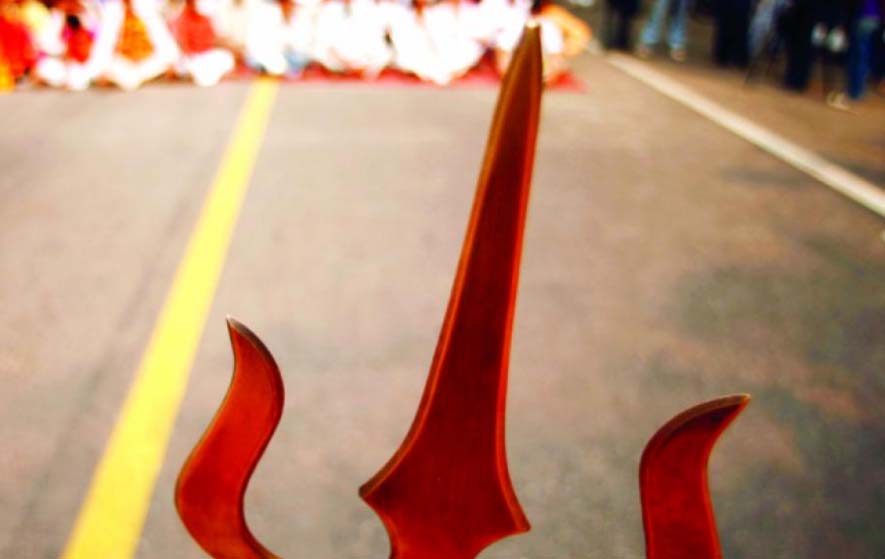
Under the leadership of the Rashtriya Swayamsevak Sangh (RSS), the right-wing organisations have been utilising the temples for propagating their Hindutva agenda. Being home to lakhs of temples, Tamil Nadu provides a perfect platform for the Sangh Parivar to promote its propaganda.
With a 50:50 ratio of minority and majority population, Kanyakumari district has become a perfect place to experiment for the RSS and its affiliates. The right-wing has successfully managed to intrude into the day to day activities in the temples controlled by the government in the form of devotee organisations. These organisations have a free run in the temples outside the government regulations, including those managed by individuals and trusts.
From conducting preaching classes on weekends, organising special sessions for women and children and organising festivals, the right-wing organisations have their say in all activities.
The negligence of the State government and an increasing number of vacancies in government-run temples help the right-wing groups gain the upper hand in dictating terms. The democratic and religious organisations have been long demanding the government to stop the intervention of right-wing groups.
LETHARGY IN ADMINISTRATION HELPING RIGHT-WING
The Hindu Religious and Charitable Endowments (HR&CE) department manages around 44,000 temples across the state, of which 490 are located in Kanyakumari district and Shenkottai taluk of Tirunelveli district. These temples are controlled by the joint commissioner of incorporated and unincorporated Thirukovilgal (temples), situated in Suchindram.
The increasing vacancies and negligence of administration are helping the right-wing activists intrude into the temples’ daily affairs. “The successive governments have not given sufficient attention to the temples attached to the HR&CE department. The lack of staff in temples has led to the intervention of right-wing groups,” said Aji Kumar, district general secretary of Kanyakumari DIstrict Temple Workers Union.
The functioning of 5 regional offices controlled by the joint commissioner is also being criticised frequently. The Superintendent’s office of the Kuzhithurai region has long been closed. The office is entrusted with monitoring 90 temples and several educational institutions.
A temple worker in the division accused the right-wing organisations and a few officers of being hand in glove. “The officials support the right-wing groups so that they do not need to spend time in office. In certain temples, the complete administration is run by the people belonging to Bharatiya Janata Party (BJP) and the Rashtriya Swayamsevak Sangh (RSS),” he said.
The Centre of Indian Trade Unions (CITU), to which the temple’s workers are affiliated, have been continuously demanding the government to curb the intervention of Sangh Parivar organisations in the temple activities.
“These people are intervening in temple administration purely for their political gains, and they do not have spirituality in their minds,” the worker accused.
FAILURE IN OTHER DISTRICTS
However, the Sangh Parivar organisations cannot emulate the success in other districts as they have achieved in Kanyakumari. Prof Arun Kumar, a researcher and assistant professor at Gautam University, Bengaluru, opined that the success is a result of the religious complexion of the district.
“The Sangh Parivar organisation has been successful purely because of the Hindu- Christian polarisation, which is being strengthened through the temples. Their primary focus is on getting hold of the ‘temple committees’, which is a traditional practice in the district,” he said.
In other districts, the formula has failed, including in Coimbatore, where several Sangh Parivar groups have a considerable presence. The organisations have initiated several plans, including the ‘Hindu Temple Reclamation Organisation’, but have not succeeded.
“In Coimbatore, the organisations utilise temple space for conducting free tuitions only in around five places in the district. The organisations have made small inroads in Theni, Cumbum and Uthamapalayam areas by organising committees to retrieve deserted temples. But their success is minimal, and the organisations have not gained electorally in any other districts,” Arun said.
INTRUSION IN PRIVATE TEMPLES
Apart from the temples under HR&CE control, tens of thousands of temples are managed by individuals and trusts. The Sangh Parivar organisations have been trying to bring these temples under a single umbrella but cannot move at the pace they wish.
“There are around 6,000 temples in Kanyakumari district alone in this category. A Hindu Temple Confederation was initiated in 2018, and only 800 temples have joined this so far. For the last couple of years, this organisation has been in a stagnated state Arun said.
The temple trusts are managed by different caste groups, in which the Sangh Parivar has managed to earn a considerable presence.
“The right-wing activists become a part of the temple committees and dominate the proceedings. Once their intentions of introducing Brahmanical practices in small temples and political gains get exposed, the people used to kick them out,” said a trustee of a temple seeking anonymity.
Though the success is limited to only one district, the Sangh Parivar is desperately trying to utilise temples as their base for political gains. The devotees, workers and section of the public are demanding the government’s intervention to restrain the right-wing groups from capturing temples.
Courtesy: Newsclick.in